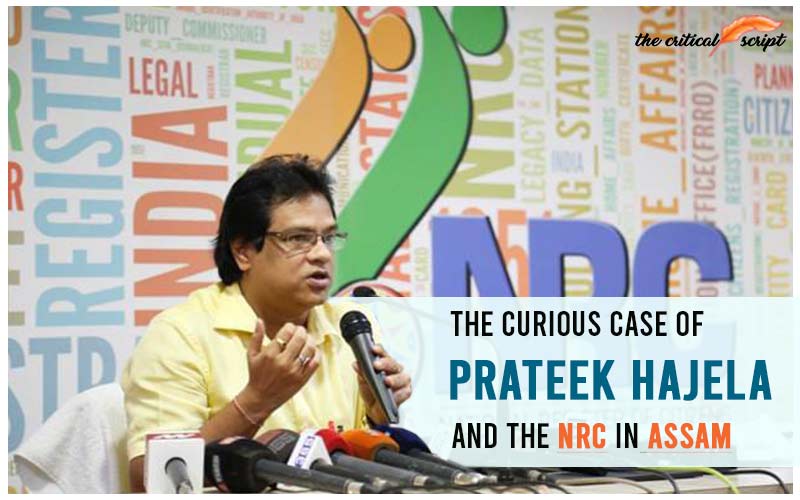
The Curious Case of Prateek Hajela and the NRC in Assam
The National Register of Citizens (NRC)
project in Assam, aimed at identifying legal residents and distinguishing them
from illegal immigrants, has been one of India’s most controversial
administrative undertakings. At the center of this massive exercise was
PrateekHajela, an IAS officer from the Assam-Meghalaya cadre, who served as the
NRC's State Coordinator. While the project was seen as critical to addressing
Assam’s complex migration issues, its implementation led to legal, financial,
and administrative disputes that have spotlighted Hajela’s role.
Background: The NRC Initiative
The NRC was first compiled in Assam in
1951 to document the state's legal residents. Decades later, amid growing
concerns over illegal immigration from Bangladesh, the Supreme Court ordered an
update of the NRC in 2013. PrateekHajela was appointed to lead this politically
and socially sensitive task.
Under his leadership, the NRC process
engaged over 55,000 government employees, involved digital technologies, and
reviewed more than 3.3 crore applications. In August 2019, the final NRC list
was published, excluding approximately 19 lakh people—a move that sparked
widespread dissatisfaction.
The Allegations Against PrateekHajela
While the NRC list was controversial in
its outcomes, it also raised questions about financial integrity, procedural
transparency, and ethical practices under Hajela’sleadership.The process
resulted in a highly debated final list and revelations of financial
irregularities amounting to misuse of ₹1,579.78 crore.
A detailed audit by the Comptroller and
Auditor General (CAG) unearthed significant irregularities in the use of funds
allocated for the NRC exercise:
Software and System Mismanagement:
215 software utilities were added to the
NRC system without proper protocols or competitive tendering. This
"haphazard" development created vulnerabilities for data tampering
without leaving an audit trail
Overpayments to Vendors:
Payments to vendors exceeded approved
limits. Wipro Limited, responsible for software development and data
management, reportedly violated the Minimum Wages Act by underpaying data entry
operators by 45.59%-64.27%, leading to undue profits.
Escalated Project Costs:
The project cost surged from ₹288.18
crore in 2014 to ₹1,602.66 crore by 2019. The steep escalation raised questions
about fiscal accountability
Inclusion of Illegal Immigrants
Hajela has been accused by his successor,
Hitesh Dev Sarma, of deliberately including illegal Bangladeshi immigrants in
the NRC. Activist groups such as Assam Public Works have echoed these claims,
filing complaints about manipulation in the NRC update. Critics argue that
these discrepancies undermine the credibility of the entire process
Procedural Shortcomings
The NRC process faced accusations of
errors in verifying documents and claims that indigenous communities were
excluded while non-natives were included. This triggered calls for
re-verification of entries, with political and civil society groups asserting
that the process failed to meet its objectives
Transfer and Retirement
Following threats to his safety and
rising tensions, the Supreme Court transferred Hajela to Madhya Pradesh in
October 2019. In 2023, Hajela sought voluntary retirement from service, which
was approved by the Assam government. This move added another layer of intrigue
to his already controversial career.
PrateekHajela now faces multiple court
cases in Assam:
●
Financial Mismanagement: Allegations of misused
funds have led to criminal revision petitions and summons by the court.
●
FIRs and Complaints: Organizations like Assam
Public Works have filed FIRs accusing Hajela of manipulating the NRC’s outcomes
to favor illegal immigrants.
The Broader Implications
The NRC exercise under Hajela’s
leadership has left a deep imprint on Assam’s socio-political fabric. While the
project aimed to resolve identity issues and safeguard Assamese cultural
integrity, it has raised more questions than answers. Key concerns include:
●
Credibility of the NRC: Demands for
re-verification persist as questions linger over the exclusion of 19 lakh
people.
●
Impact on Affected Families: Those left out of
the NRC face legal battles and uncertainty over their citizenship.
●
Administrative Challenges: The procedural
shortcomings have exposed systemic inefficiencies and lapses in governance.
The saga of PrateekHajela and the NRC in
Assam reflects the challenges of balancing administrative accountability with
political and social complexities. As court cases proceed and calls for
re-verification intensify, the NRC project remains a polarizing issue in
Assam’s history. It underscores the need for transparent governance and
inclusive decision-making in addressing sensitive issues like citizenship and
migration.
Disclaimer: The opinions expressed in this article are those of the author's. They do not purport to reflect the opinions or views of The Critical Script or its editor.

Newsletter!!!
Subscribe to our weekly Newsletter and stay tuned.

















Related Comments